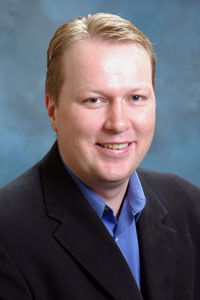Study in the journal Stroke builds on research to improve communication skills of people with aphasia
February 7, 2011

Dr. Julius Fridriksson of the
Department of Communciation
Sciences and Disorders has new
findings in journal Stroke.
Electrical stimulation to the brain offers a possible way to enhance the effect of cognitive and physical therapy for stroke victims, according to a recent report in the online issue of the journal Stroke.
Dr. Julius Fridriksson, a nationally recognized stroke researcher in the Arnold School's Department of Communications Science and Disorders, is studying ways to help stroke patients with aphasia, a communication disorder caused by damage to the language regions in the brain's left hemisphere.
The article in Stroke is another in a series of reports, including one published last fall in the Journal of Neuroscience, that center on improving communication skills for people with aphasia. Stroke is the leading cause of disability among adults, more than accidents or complications from Parkinson's or Alzheimer's diseases, Fridriksson said.
In the study, researchers demonstrated how anodal transcranial direct current stimulation (A-tDCS) can enhance the effect of behavioral aphasia treatment.
"So far, the success of behavioral treatment of stroke has been, at best, very moderate. What this study offers is a possible way to enhance the effect of cognitive and physical therapy in stroke," he said.
"Furthermore, it is possible that this method of direct current stimulation may also aid recovery from other kinds of brain damage associated with things such as gunshot wounds and traumatic brain injury," Fridriksson said.
The study is an important step in learning more about the effect of direct current stimulation in the treatment of aphasia.
"Clearly, more research is needed," said Fridriksson. "Our hope is that in the future, research such as this may aid aphasia recovery."
The study's authors also included Dr. Jessica D. Richardson and Dr. Julie M. Baker, both from the Arnold School's Department of Communications Science and Disorders, and Dr. Chris Rorden, a former USC colleague currently on the staff of the Georgia State/Georgia Tech Center for Advanced Brain Imaging.



_01.jpg)
_02.jpg)